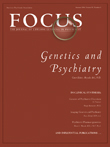There has been an explosion in psychiatric genetics literature in recent years. One cannot open a psychiatric journal today without reading about genotypes, phenotypes, gene–environment interactions, etc. Although many of our disorders are familial, they are not thought to be genetically simple, in the Mendelian sense, and psychiatrists are not usually trained in genetics. Do we really need to learn the language of geneticists and understand the psychiatric genetics literature? Is this an opportunity to finally uncover the mysteries of schizophrenia and bipolar disorder, or is it a passing fad that, as clinicians, we can afford to ignore?
The fact is, despite sustained research efforts into psychiatric disorders, we still know very little about their underlying etiology and pathophysiology. Few risk factors or indicators of susceptibility to psychiatric disorders have been identified, with family history and early trauma being the exceptions, making prevention extremely challenging. We have reliable diagnoses and effective treatments for psychiatric disorders. However, we still lack tools, such as biological markers, that can help us make reliable and valid diagnoses and tailor our treatments to the individual patient. For patients, their families, and their clinicians there is a great deal of urgency and a need for discoveries that can reduce the burden of mental illness.
Recent dramatic advances in genetics, including the completion of the Human Genome Project in April 2003 and the more recent completion of the HapMap Project in Fall 2005, present an opportunity that we cannot, as practitioners in a field, afford to miss. Our disorders are not only familial but highly heritable. Identifying genes that either confer risk for psychiatric disorders or that are involved in treatment response could provide an inroad into the neurobiology of these disorders and/or mechanisms of treatment. Since the Human Genome Project was completed, almost all genes for Mendelian disorders have been identified. Our disorders, however, like many other large public health problems such as diabetes and heart disease, are “complex genetic disorders.” The definition of complex disorder includes the lack of a clear Mendelian pattern of inheritance and the likely involvement of multiple genes, each having a small effect. Unfortunately, identification of these disorders is often plagued by the imprecise distinction between health and disease and a lack of direct correspondence between the genotype and the phenotype. The road to discovery, therefore, is likely to be fraught with some dangers and the strategies used to conduct genetic studies of psychiatric disorders should be carefully considered. Because genes do not code for hallucinations or anhedonia, genetics can only help us if we use its discoveries to further our understanding of the brain and behavior. Genetics can lead us to molecules or molecular cascades of relevance, but it remains the work of basic neuroscientists and basic behavioral scientists to cross levels of analysis to cells, neural systems, and the whole feeling, thinking, and behaving person. Nevertheless, genetics can direct us to study molecules and molecular cascades that we never suspected to be involved in psychiatric disorders (dysbindin and schizophrenia, for example) or shed light on molecular systems already implicated (catechol O-methyltransferase and cognitive deficits). Moreover, genetics may catalyze redefining of psychiatric nosology but only if clear links between genotypes and well-defined phenotypes and endophenotypes are established.
In this issue of FOCUS, Dr. Burmeister provides a clear and helpful primer to the genetics of psychiatric disorders in which she describes commonly used strategies and the current status of gene identification in our field. It is accompanied by a glossary to help the nongeneticist become familiar with terms critical for understanding the literature. Drs. Kempf and Meyer-Lindenberg provide an overview of imaging genetics, an exciting new approach to linking genes to brain function. In their article, they describe some of the studies using state-of-the-art imaging methods but, more importantly, lay out the concepts and strategies that this approach is based on. Finally, Dr. Mrazek, in his article on psychiatric pharmacogenomics, focuses on two areas of direct relevance to psychiatry: the effects of variations in drug-metabolizing enzyme genes and their role in the pharmacokinetics of psychiatric medications and the effects of genetic variations in two serotonergic proteins on the treatment response to serotonin reuptake inhibitors.
I hope this issue will help the readers become familiar with terms, strategies, and concepts in psychiatric genetics that facilitate their critical reading of this, sometimes overwhelming, literature. Although, as Dr. Kendler wrote “the genetic contributions to psychiatric disorders …” are likely to be “embedded in complex causal pathways,” they can lead us to the right pathways to study and, hopefully, to breakthroughs that improve the lives of our patients.

